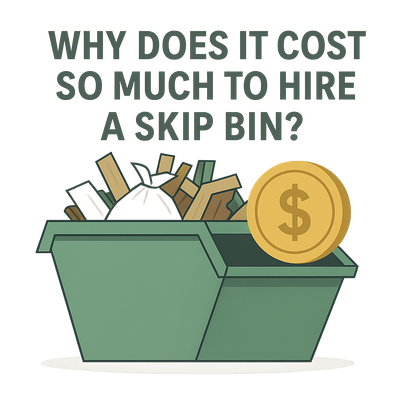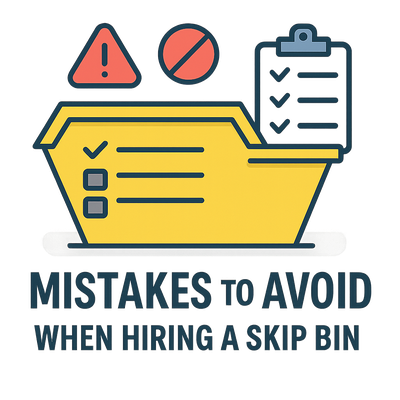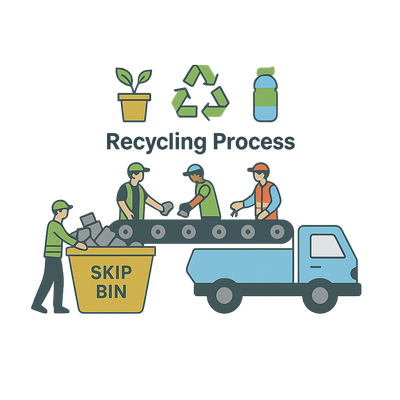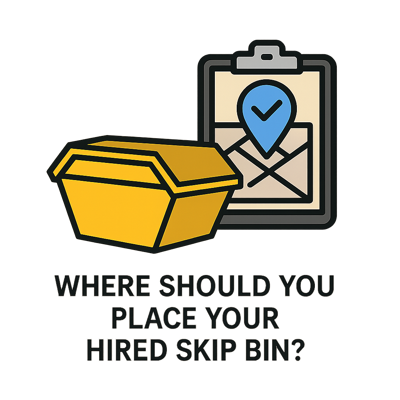
By Brimbank Bin Hire - September 2025
If you’ve ever hired a skip bin for a clean-up, renovation or business project, you may have asked: why is it so expensive? At first glance the price seems high for what appears to be a simple service – a metal container placed at your site, filled, and picked up. But the real cost of skip-bin hire reflects many behind-the-scenes factors, from regulatory fees to transport logistics and sorting recycled materials.
What You’re Paying For
When you book a skip bin, the quoted price covers more than just delivery and collection. It covers permit application (if on public land), insurance, the truck and driver, fuel, bin maintenance, and more. Many customers assume the skip company simply drops and picks up the bin, but in reality the provider also manages disposal, recycling, site-licencing and risk management.
Landfill Levies and Recycling Costs
One of the largest cost components is the landfill levy, that's a fee imposed by the state or local government every time waste is sent to landfill. These levies have been increasing steadily. For example, across Australia waste-disposal fees and levies have added significant costs to rubbish removal services.
Additionally, many skip-bin companies try to maximise recycling to reduce waste sent to landfill, which means sorting, separating materials, and managing recycled streams. All of this adds labour, capital equipment and facility-costs.
Fuel, Labour and Vehicle Operations
Skip-bin hire involves heavy trucks, licensed drivers, fuel consumption and vehicle maintenance. Rising fuel prices, labour shortages and increasing maintenance costs all contribute to higher end-costs. The hire company funds staff training, safe operation of vehicles, local permits and logistical planning for each delivery and pick-up.
Bin Maintenance, Wear & Tear
The skip containers themselves, though they seem simple, are expensive. They require robust steel construction, regular repainting, stamping of load-limits, maintenance of lifting gear and compliance with safety regulations. Over time the cost of upkeep rises, and older gear may need to be replaced – all of which is factored into hire rates.
Waste Type and Weight Limitations
The kind of waste you dispose of and its weight makes a difference. Mixed loads, construction debris, concrete, bricks or soil weigh more and incur higher disposal charges. If a skip exceeds its weight limit, the company often adds an excess-charge. Transparent pricing requires you to check the service contract for weight-inclusions and any exclusions.
Permit and Placement Costs
If your skip is placed on public land (roadway, footpath or nature strip) you’ll need a council permit. This permit cost and required signage add to your hire charges. Even skips on private property may involve complex lifts or restricted access which increase cost due to specialised equipment.
Duration of Hire and Project Timing
How long you keep the bin also changes cost. A typical hire may include a one-week period; if you keep it for longer, or if your project is extended, the provider may charge extra days. Peak times for bins (renovation season, holidays) may also see higher demand and higher price quotes.
Transport and Geography
Location matters. If you’re in a remote area, or the skip company must travel a long distance to deliver or collect, fuel, time and vehicle-costs rise. Urban centres, narrow drives, restricted access or traffic conditions may also increase labour time and risk, affecting the fee.
Supply Chain and Regulatory Pressures
The wider waste management industry is also under pressure. Reduced recycling export markets, stricter regulations on waste streams, and rising site-fees all push skip-bin hire rates upward.
“The skip bin hire fee reflects hidden costs, like heavy trucks, regulatory fees, recycling, and dispatch time, not just dropping a container.”
Tips to Get Better Value
Here are some ways to reduce your skip-bin hire cost and avoid surprises:
- Choose the right size bin so you don’t overpay for unused capacity.
- Book well ahead of time – waiting until the week of your project may mean higher costs.
- Separate recyclables (metals, timber, concrete) from general waste where you can; ask your provider if they offer discounts for cleaner loads.
- Ensure you understand what is and isn’t allowed in the skip to avoid hidden excess weight or prohibited-item fees.
- Check whether the price includes a permit if the bin will sit on public land, and whether it includes collection within a set period.
“We make skip-bin hire easy, cost-transparent and efficient, so you can focus on your project, not the rubbish removal.”
How Can We Help You?
We at Brimbank Bin Hire assist both homeowners and businesses to get skip-bin solutions that deliver excellent value and service. We assess your project, recommend the correct size, explain permit requirements, and provide clear pricing upfront. We monitor recycle-rates, maintain our fleet efficiently, and pass savings to you. By trusting us, you gain skip-bin hire that’s professional, transparent and tailored to your needs.
 Brimbank Bin Hire
Brimbank Bin Hire

